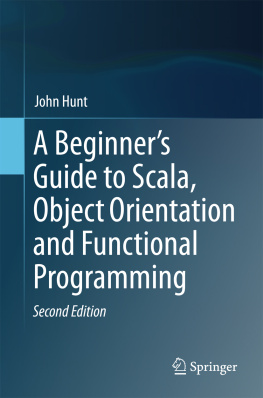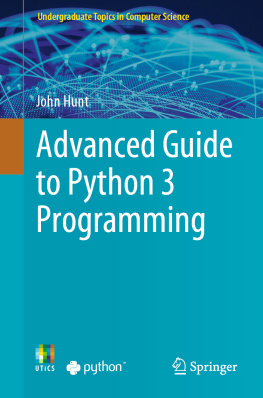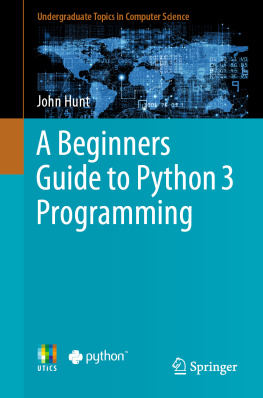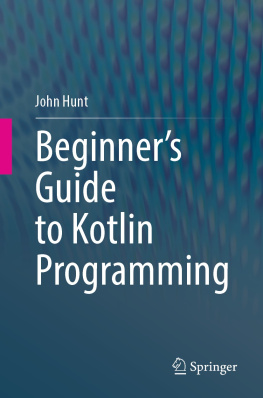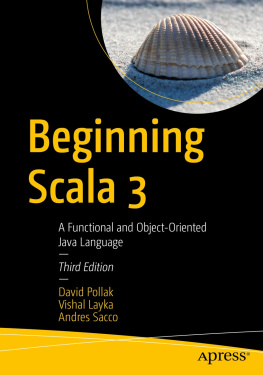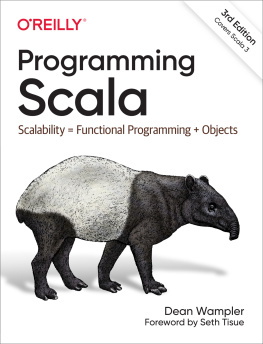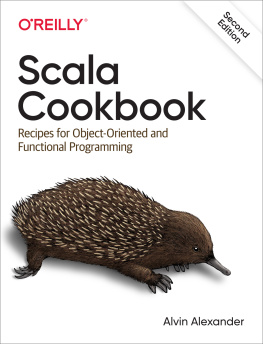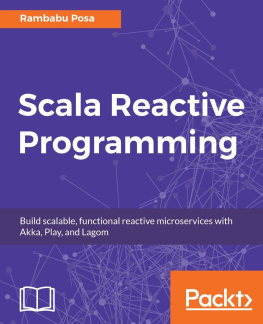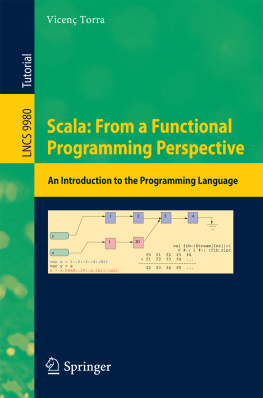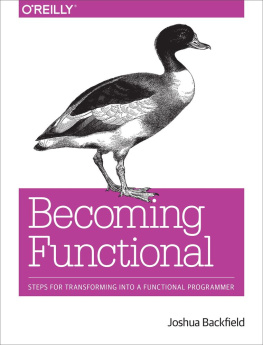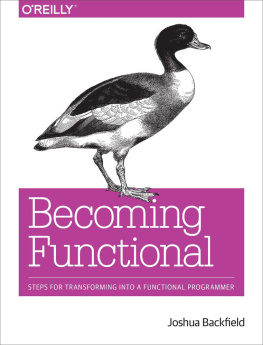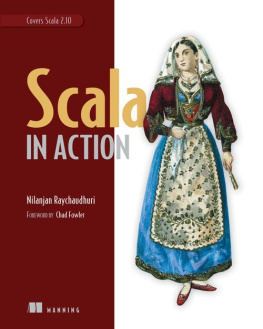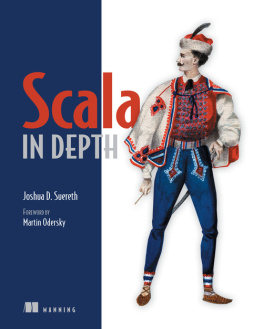John Hunt - A Beginner’s Guide to Scala, Object Orientation and Functional Programming
Here you can read online John Hunt - A Beginner’s Guide to Scala, Object Orientation and Functional Programming full text of the book (entire story) in english for free. Download pdf and epub, get meaning, cover and reviews about this ebook. year: 0, publisher: Springer International Publishing, genre: Computer. Description of the work, (preface) as well as reviews are available. Best literature library LitArk.com created for fans of good reading and offers a wide selection of genres:
Romance novel
Science fiction
Adventure
Detective
Science
History
Home and family
Prose
Art
Politics
Computer
Non-fiction
Religion
Business
Children
Humor
Choose a favorite category and find really read worthwhile books. Enjoy immersion in the world of imagination, feel the emotions of the characters or learn something new for yourself, make an fascinating discovery.
A Beginner’s Guide to Scala, Object Orientation and Functional Programming: summary, description and annotation
We offer to read an annotation, description, summary or preface (depends on what the author of the book "A Beginner’s Guide to Scala, Object Orientation and Functional Programming" wrote himself). If you haven't found the necessary information about the book — write in the comments, we will try to find it.
A Beginner’s Guide to Scala, Object Orientation and Functional Programming — read online for free the complete book (whole text) full work
Below is the text of the book, divided by pages. System saving the place of the last page read, allows you to conveniently read the book "A Beginner’s Guide to Scala, Object Orientation and Functional Programming" online for free, without having to search again every time where you left off. Put a bookmark, and you can go to the page where you finished reading at any time.
Font size:
Interval:
Bookmark:
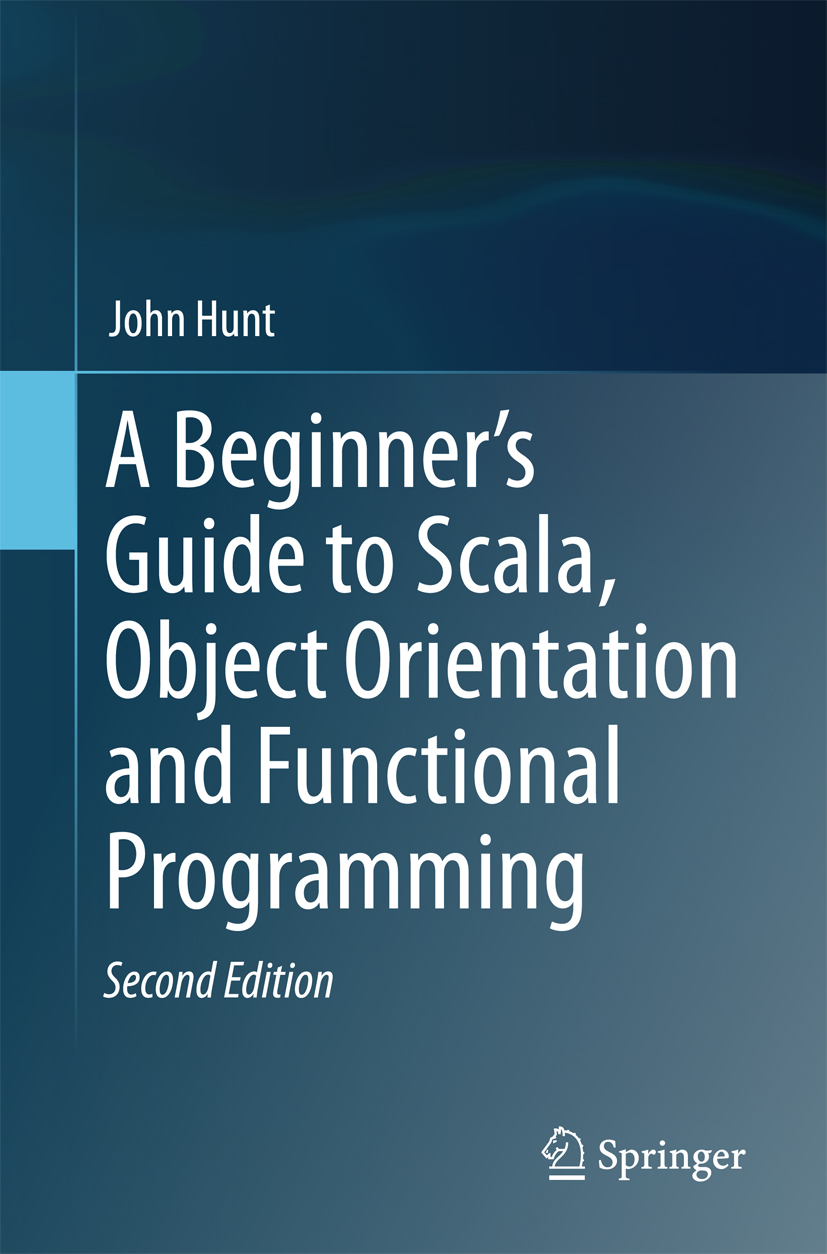

This Springer imprint is published by Springer Nature
The registered company is Springer International Publishing AG
The registered company address is: Gewerbestrasse 11, 6330 Cham, Switzerland
This book is dedicated to my wife Denise; you are a constant source of inspiration to me.
This book is intended as an introduction to Scala for computer science students or those actively involved in the software industry. It assumes some familiarity with standard computing concepts, such as the idea of compiling a program and executing this compiled form, and with the basics of procedural language concepts such as variables and allocation of values to variables. However, the early chapters of the book do not assume any familiarity with Object Orientation nor functional programming. They also step through other concepts with which the reader may not be familiar (such as list processing). From this background, it provides a practical introduction to object and functional technology using Scala, one of the newest and most interesting programming languages available.
This book introduces a variety of concepts through practical experience. It also tries to take you beyond the level of the language syntax to the philosophy and practice of Object-Oriented development and functional programming.
In the remainder of this chapter, we will consider what Scala is, why you should be interested in Scala and whether this book is for you.
Scala is a new programming language developed by Martin Odersky and his team at the EPFL (Ecole Polythenique Fererale de Lausanne, Lausanne, Switzerland) and now supported by Lightbend Inc. (previously known as Typesafe).
The name Scala is derived from Sca(lable) La(nguage) and is a multi-paradigm language, incorporating Object-Oriented approaches with functional programming.
What does this mean in practice? It means that you can write applications as pure Object-Oriented solutions using Classes, Objects and Traits. You can exploit inheritance, polymorphism and abstraction and encapsulation techniques. In this respect, Scala is very much like any other Object-Oriented language (such as Java, C# or C++). However, you can also develop solutions using purely functional programming principles in a similar manner to languages such as Haskell or Clojure. In such an approach, programs are written purely in terms of functions that take inputs and generate outputs without any side effects.
Scala though is different in that it is a hybrid programming language. That is, it is possible to combine the best of both worlds when creating a software system. You can therefore exploit Object-Oriented principles to structure your solution but integrate functional aspects when appropriate. Whilst this approach is not unique (the Common Lisp Object Systems did something similar in the 1980s), it is certainly bringing functional programming to the mainstream and integrating it within an environment that can execute almost anywhere.
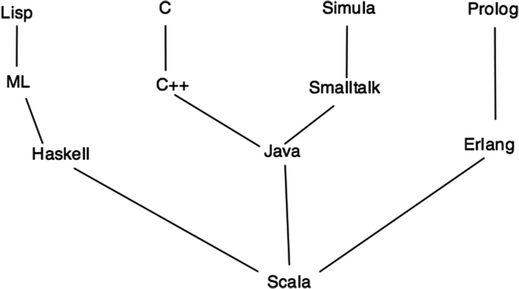
Scala Genealogy
This of course raises the question why Scala and why now? There are a number of reasons why Scala should be a language that is given serious consideration by any development project. We have already mentioned that fact that it coherently brings together two very powerful programming paradigms that combined can allow very elegant, concise and maintainable systems to be created. However, there are other reasons why Scala is of interest. The first is that Scala can be compiled to Java Byte Codes. This means that a Scala system can run on any environment that supports the Java Virtual Machine (or JVM). There are already several languages that compile to Java Byte Codes. This list includes Java but also extends to Ada, JavaScript, Python, Ruby, Tcl and Prolog. Scala is just another such language. However, this has the additional advantage that Scala can also be integrated with any existing Java code base that a project may have. It also allows Scala to exploit the huge library of Java projects available both for free and for commercial use.
A scalable language suitable for the construction of component based software within highly concurrent environments.
This means that it has several features integrated into it that support large software developments. For example, the Actor model of concurrency greatly simplifies the development of concurrent applications. In addition, the syntax reduces the amount of code that must be written by a developer (at least compared with Java). This is because it avoids a lot of the boilerplate code that any Java developer will be familiar with.
Font size:
Interval:
Bookmark:
Similar books «A Beginner’s Guide to Scala, Object Orientation and Functional Programming»
Look at similar books to A Beginner’s Guide to Scala, Object Orientation and Functional Programming. We have selected literature similar in name and meaning in the hope of providing readers with more options to find new, interesting, not yet read works.
Discussion, reviews of the book A Beginner’s Guide to Scala, Object Orientation and Functional Programming and just readers' own opinions. Leave your comments, write what you think about the work, its meaning or the main characters. Specify what exactly you liked and what you didn't like, and why you think so.

